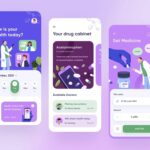Top AI Trends in Web Development
There was a remarkable surge in the AI landscape last year. We may now anticipate the appearance of a variety of cutting-edge procedures as well as more creative uses of AI for web development.

AI Trends in Web Development
Web developers must stay up to date on the latest AI trends and technologies to enhance productivity in the field, as seen by the emergence of large language models (LLMs) and optimization tools in the form of website content.
With the introduction of ChatGPT, generative AI has made tremendous progress. Current industrial breakthroughs are entering their implementation phase, resulting in a wave of new advances in web development. An extraordinary number of inventions are entering the sector at this time, and these are easily implemented by companies like an ai software development company.
In light of this, let’s examine a few major themes about trends in artificial intelligence in web applications in 2024 and beyond.
1. Chatbots and Virtual Assistants
Chatbots and virtual assistants that interact conversationally with users are becoming a standard feature on websites. According to Juniper Research, the market for these will grow by 470% from 2023 to 2028.
Types of Chatbots
There are two main types of chatbots used on websites:
Rule-based chatbots. These are programmed to provide responses to some questions that have been pre-constructed. They offer their customers with good customer support throughout the day and night.
AI-powered chatbots. Farther developed, they employ NLP (natural language processing) to comprehend context and intent. This makes the conversation to be natural and free flowing.
Benefits
Integrating an intelligent chatbot on a website provides multiple benefits:
- Improves the usage of the system from the side of the users due to the opportunity to get instant and individualized answers.
- Saves customers’ time in having to contact the support team for frequently asked questions.
- Generates more sales leads through active participation of the site users.
With advancing technology in chatbots, more and complicated customer service issues will be attended to by the bot.
2. Recommendation Engines
Recommendation engines are being incorporated into more websites to deliver individualized content and product suggestions. These AI systems track browsing data, purchase history, and other inputs to build a profile of each user. The engine then matches the profile to recommend relevant items.
Netflix and Amazon pioneered this technology. Now recommendation engines are essential for sites focused on ecommerce, media streaming, social media feeds, and more.
Benefits
Key advantages of website recommendation engines:
- Increase sales by suggesting products aligned with user interests.
- Improve customer experience by delivering personalized content.
- Reduce churn by keeping users engaged with relevant recommendations.
As machine learning models progress, recommendations will become more accurate and impactful.
3. Natural Language Processing (NLP)
NLP is powering the language understanding capabilities of chatbots, virtual assistants, and other AI applications. With NLP, these tools can parse text, understand intent, interpret semantic meaning, engage in dialogue, and respond appropriately.
Website users benefit from NLP through:
- Conversational interfaces (chatbots, search, support tools).
- Improved document comprehension and information retrieval.
- More engaging and intuitive interactions.
As neural networks expand NLP capacities, expect web interfaces enabled by AI language skills to proliferate.
4. Automated Design Workflows
AI is beginning to assist with and enhance design workflows for creating websites. For example:
Generative design. New sites like Anthropic generate website layouts after a few prompts about purpose, style, and other criteria. This kickstarts the design process rapidly.
Visual recommendations. Tools like EyeEm Vision suggest fonts, color palettes, stock images, and other design elements that work well together. This accelerates styling decisions.
Copywriting. Companies like Jasper and Rytr offer AI-powered content creation to develop on-brand marketing copy and website text faster.
Automating parts of the design process enables faster and more efficient web development lifecycles.
5. No-Code Site Builders
No-code website builders like Bubble and Webflow are gaining popularity because they use AI in web development. These tools allow the creation of sites via drag-and-drop interfaces and smart templates instead of manually coding.
Key features of no-code AI site builders:
- Intuitive visual interfaces to design page layouts.
- AI-powered recommendations for assets/templates.
- Natural language commands to add/edit elements.
- Built-in animations and interactions.
No-code solutions open web development to new audiences of creators without coding skills. AI empowers and optimizes the no-code site-building experience.
 6. AI Cloud Platforms
6. AI Cloud Platforms
Leading cloud platforms are infusing AI services to help developers quickly integrate smart capabilities:
Google Cloud. Products like Vision AI, Natural Language, Speech-to-Text, and AutoML Tables help to add AI to applications.
AWS SageMaker. Allows building, training and deploying of machine learning models in a fairly short time.
Microsoft Azure. Cognitive Services is an umbrella for ready-made AI solutions for vision, speech, language, search, and much more.
Cloud-based AI helps developers to avoid the creation of complex models from scratch. But they can build upon existing solutions to speed up the development process.
7. AI Assistants for Developers
AI coding assistants are emerging to boost developer productivity. These tools analyze project code and use machine learning to provide recommendations and insights. Key examples:
GitHub Copilot. Suggests lines of code in real-time based on code context and training on public code repositories.
Tabnine. Autocompletes code as you type, drawing on deep learning models. Allows faster coding with fewer errors.
Error detection. Spots bugs in code and highlights issues to address, speeding up troubleshooting.
As AI assistants grow more advanced, they will drastically automate and amplify coding efforts.
8. Generative AI Models
Some of the examples of generative AI models are text, image, video, 3D model, code generation and other digital contents can be created by the AI system itself. These are built from huge data sets and then learn how to produce new high quality output.
Website creators can leverage generative AI to:
- Generate design assets – Logos, images, icons, animations.
- Develop textual content – Website copy, articles, product descriptions.
- Produce code – HTML, CSS, JavaScript.
- Create interactive 3D models – For product configurators or digital experiences.
As generative models progress, they will unlock new efficiencies in designing and building digital experiences.
9. AI Testing and QA
AI and web development have now become close friends. In addition, AI makes testing easier and speeds up problem detection:
Visual testing. AI compares website versions to detect layout, styling, or component changes proactively.
Accessibility testing. Analyzes sites for compliance with disability access standards like WCAG 2.1 guidelines.
Cross-browser testing. Tests that sites look and function correctly across different browsers.
Performance testing. Monitors page load speeds and recommends performance optimizations.
Automating parts of the QA process with AI allows catching more problems early. This results in higher-quality digital products.
10. AI-Powered Web Hosting
Web hosting platforms are integrating AI-driven optimizations:
Smart resource allocation. Monitors traffic and demands to allocate server resources dynamically.
Enhanced cybersecurity. Uses AI pattern detection to identify and block sophisticated hacking attacks.
Automated backups. Intelligently schedules backups based on traffic and usage.
Site accelerations. Applies performance tuning measures to speed up page loads.
AI-optimized web hosting provides sites with greater security, speed, scalability, and reliability.
The Future with AI
This overview highlights how artificial intelligence in web development is transforming major aspects of designing, building, powering, and testing. As machine learning and neural networks continue advancing, AI integration will only deepen.
Soon, AI based web development will become simple and clear. It will conceptualize designs, generate content and media assets, implement DevOps hosting architecture, and more with minimal human input.
However, AI in web development will augment rather than replace developers. Unique human creativity and strategic thinking will remain vital. AI will amplify these talents exponentially while handling routine coding and design tasks.
As to the future of web development, it will be all about working with AI partners that become increasingly intelligent with the help of smooth cooperation between people and machines. This synthesis will allow creating extremely complex, engaging and smart website experiences beyond the current possibilities.
We are in for some interesting years to come as AI revolutionizes and takes website and app development to the next level!


